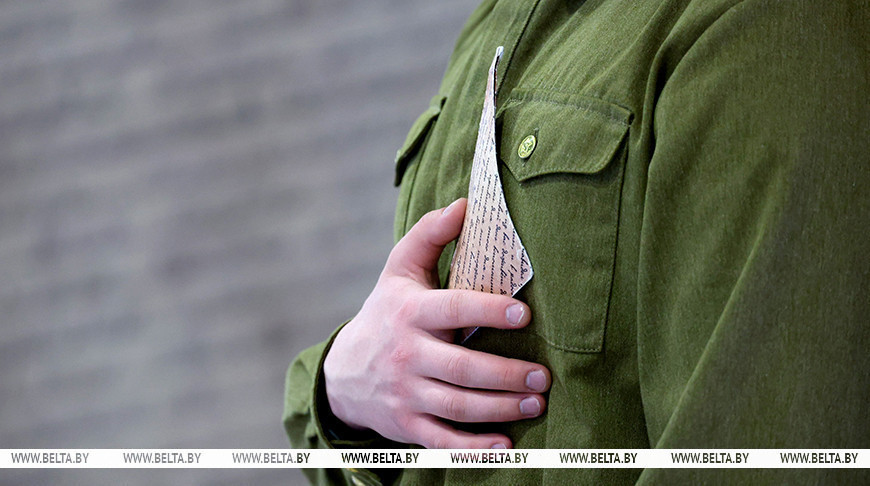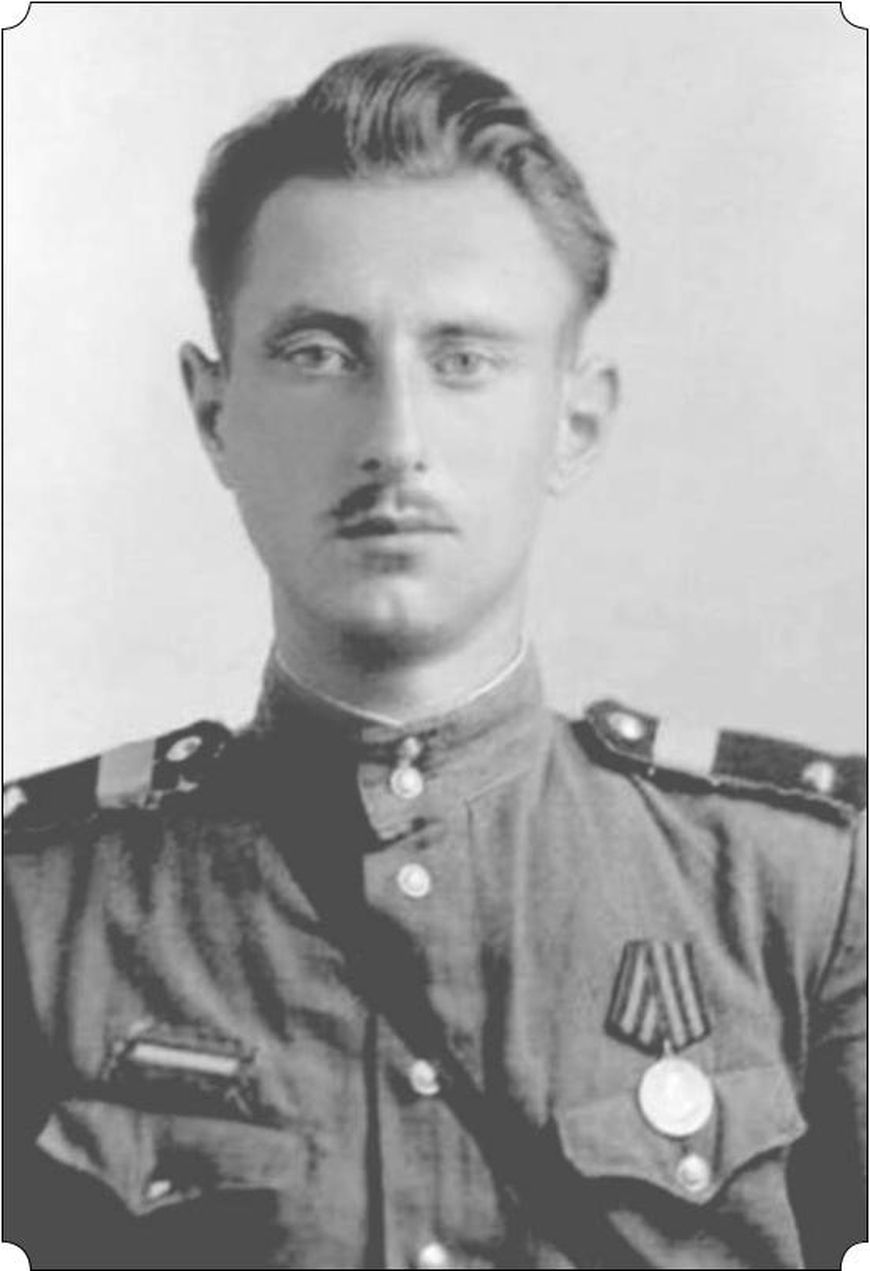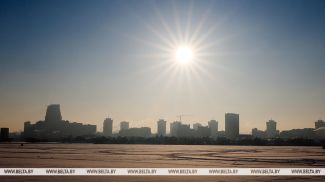
An archive photo
News of the story
"Victory Parade: Stories and Faces"
“Dear Mommy! The coming days will be the hardest time for our entire family and for me. You know the aftermath of battles, but no matter what happens, be sure that I have done everything I could for you, for the Motherland, as a Komsomol member. Let the grief be alleviated by the proximity of victory, the defeat of German fascism,” wrote Vladimir Posse, a telephone operator, to his family on 9 June 1944. The following weeks really put him to the test: fierce battles for Vyborg, injury, hospital... But Sergeant Posse was right: the long-awaited Victory came less than a year later.
People, tears, fear and blood
Vladimir Posse was a historian by profession, and after the war he worked for many years at the Institute of History of the Academy of Sciences of the BSSR, after that at the Institute of Party History under the Central Committee of the Communist Party of Belarus, and the Minsk Institute of Culture. He passed away in June 2017, leaving behind hundreds of pages of memoirs. They featured his school years, childhood friends, and family tragedies, but most of his reminiscences were dedicated to the Great Patriotic War.
Describing the last peaceful months of 1941, Vladimir Posse recalled a city chess tournament, his passion for theater, and the Komsomol that he joined being inspired by his mother's friend Marina Malakovich. During the war, she led the underground movement of party and Komsomol members in the village of Kolodishchi and in 1943 was brutally killed by the Nazis in a Minsk prison.
When the Great Patriotic War began, Vladimir Posse finished the 9th class. “People started leaving Orsha on 4 July 1941, when it became clear that neither the TB-3 squadrons, nor the fighter squadron of Orsha schoolchildren, students and workers, nor the legendary First Proletarian Division would stop the enemy. Streams of tearful and terrified people were crossing the Dnieper River. On the other bank of the river they took a rest under the shade of old linden trees at Dubrovka station. Women pushed small children and the elderly into freight trains,” Vladimir Posse recalled the horrors of the first days of the war.

The Story of the Regimental Kitten
In early June 1944, the rifle regiment where Vladimir Posse served as a signal operator was transferred to the Karelian Isthmus. The notes he made on the eve of the Vyborg offensive, which took place on 10-20 June 1944, strike with the courage of our soldiers and the horrors they had to endure.
There was also room for simple human happiness in the war. Vladimir Posse described it in his memoirs. “Among the piles of bricks and charred logs, in the corner of the stove, there was a ginger kitten, shivering and calling for help. Now, each of us could feel the warmth of a family hearth every time we passed the ‘baby’ to each other, giving it the most affectionate names. Of course, Murka and Vaska prevailed. Company commander Kravchenko named it the Regimental Kitten. It was in this guise that he went with us to break through the lines, strips, and other obstacles to our doom, to the assault on Vyborg.”
For Vladimir Posse, the Vyborg offensive operation was of particular importance. His ancestor, Konung Commandant Knut Posse, defended the same territory from the enemy in the 15th century. Four and a half centuries later, history repeated itself.
In his frontline diary, Red Army soldier Vladimir Posse described in detail the events of early summer 1944.
“9 June. Our position came under an artillery attack. We gathered our belongings and moved to the front line. On our way, we came under artillery fire and took cover on the shore of a lake. Even here mines were exploding every minute. Hundreds of planes in the air with reconnaissance missions. Finally, we reached the front line.”
“10 June. Something terrible, I have never seen such fire before. Our shells produce an unbearable howl and whistle, and the wind they create knocks us off our feet. The Finns are trying to respond, but to little effect... There is no communication with the command post. I went to the line. Near the bridge a cart with corpses broke the cable. I had to repair it. Now everything is fine, and I'm in my pillbox.”
“20 June. A fierce battle is underway. We are suffering heavy losses from artillery fire. Artillery and sniper fire continues unabated. We reached the railroad tracks, with the Finns on the other side. We took cover. There is no telephone connection. The radio is working. We have no ammunition, and the mission is failing... The battalion signalmen found us and gave us a line. Hurray! We have communication.”
“21 June. I climbed onto the rocks and fired at the Finns. A single mine wounded Zinnat, Filchagin, myself, Bartenev, the radio operator, and one more soldier. Communication was lost. Under heavy fire, we are crawling into the medical company. Vyborg is taken.”

People, tears, fear and blood
Vladimir Posse was a historian by profession, and after the war he worked for many years at the Institute of History of the Academy of Sciences of the BSSR, after that at the Institute of Party History under the Central Committee of the Communist Party of Belarus, and the Minsk Institute of Culture. He passed away in June 2017, leaving behind hundreds of pages of memoirs. They featured his school years, childhood friends, and family tragedies, but most of his reminiscences were dedicated to the Great Patriotic War.
Describing the last peaceful months of 1941, Vladimir Posse recalled a city chess tournament, his passion for theater, and the Komsomol that he joined being inspired by his mother's friend Marina Malakovich. During the war, she led the underground movement of party and Komsomol members in the village of Kolodishchi and in 1943 was brutally killed by the Nazis in a Minsk prison.
When the Great Patriotic War began, Vladimir Posse finished the 9th class. “People started leaving Orsha on 4 July 1941, when it became clear that neither the TB-3 squadrons, nor the fighter squadron of Orsha schoolchildren, students and workers, nor the legendary First Proletarian Division would stop the enemy. Streams of tearful and terrified people were crossing the Dnieper River. On the other bank of the river they took a rest under the shade of old linden trees at Dubrovka station. Women pushed small children and the elderly into freight trains,” Vladimir Posse recalled the horrors of the first days of the war.
“Grandfather and his relatives were evacuated to the Urals, Chelyabinsk Oblast. He worked as a tractor driver at a state farm, his mother, my great-grandmother, was appointed director of an orphanage,” Anastasia Porozhnyuk, Vladimir Posse's granddaughter, recalled.

Everything changed in 1942. “A little boy came galloping. A call-up paper! He stopped the tractor. His mother embroidered on a pouch: ‘I am going into battle not to die, but to win and survive,’” wrote Vladimir Posse.
The Story of the Regimental Kitten
In early June 1944, the rifle regiment where Vladimir Posse served as a signal operator was transferred to the Karelian Isthmus. The notes he made on the eve of the Vyborg offensive, which took place on 10-20 June 1944, strike with the courage of our soldiers and the horrors they had to endure.
There was also room for simple human happiness in the war. Vladimir Posse described it in his memoirs. “Among the piles of bricks and charred logs, in the corner of the stove, there was a ginger kitten, shivering and calling for help. Now, each of us could feel the warmth of a family hearth every time we passed the ‘baby’ to each other, giving it the most affectionate names. Of course, Murka and Vaska prevailed. Company commander Kravchenko named it the Regimental Kitten. It was in this guise that he went with us to break through the lines, strips, and other obstacles to our doom, to the assault on Vyborg.”
For Vladimir Posse, the Vyborg offensive operation was of particular importance. His ancestor, Konung Commandant Knut Posse, defended the same territory from the enemy in the 15th century. Four and a half centuries later, history repeated itself.
In his frontline diary, Red Army soldier Vladimir Posse described in detail the events of early summer 1944.
“9 June. Our position came under an artillery attack. We gathered our belongings and moved to the front line. On our way, we came under artillery fire and took cover on the shore of a lake. Even here mines were exploding every minute. Hundreds of planes in the air with reconnaissance missions. Finally, we reached the front line.”
“10 June. Something terrible, I have never seen such fire before. Our shells produce an unbearable howl and whistle, and the wind they create knocks us off our feet. The Finns are trying to respond, but to little effect... There is no communication with the command post. I went to the line. Near the bridge a cart with corpses broke the cable. I had to repair it. Now everything is fine, and I'm in my pillbox.”
“20 June. A fierce battle is underway. We are suffering heavy losses from artillery fire. Artillery and sniper fire continues unabated. We reached the railroad tracks, with the Finns on the other side. We took cover. There is no telephone connection. The radio is working. We have no ammunition, and the mission is failing... The battalion signalmen found us and gave us a line. Hurray! We have communication.”
“21 June. I climbed onto the rocks and fired at the Finns. A single mine wounded Zinnat, Filchagin, myself, Bartenev, the radio operator, and one more soldier. Communication was lost. Under heavy fire, we are crawling into the medical company. Vyborg is taken.”
Almost a military operation
After being wounded in a night battle on 20-21 June, Vladimir Posse was sent to Leningrad for treatment. Even there, he never parted with paper and ink. He wrote about the hospital: "To my right - an injured tank crewman, to my left - a Red Navy sailor. He keeps his trousers and cap hidden under the mattress, wearing only a striped shirt. His mother visits him often, crying. Everyone in the ward cheers her up, saying that his arms and legs are intact. The tank crewman is beyond hope, yet he also cheers her up. By doing so, he helps himself."

After recovering, Vladimir Posse was first assigned to a three-month non-combat service in the 82nd Regiment. Then he attended the Moscow Military Technical School of Communications of the USSR Border Troops. The best students of this school were selected to participate in the Victory Parade on Red Square on 24 June 1945. Vladimir Posse was among the border guards in the formation participated in the parade.
Describing the preparations for the parade, he admitted that the organization resembled planning a military operation: the date was kept secret and not publicly mentioned, participants were secretly transported and housed in barracks near Moscow, decisions on ammunition, uniforms, and rations were frequently adjusted.
“Rumor has it that marshals Budyonny and Voroshilov proposed replacing the hobnails on boots with cavalry spurs. Spurs were indeed found in arsenals near Moscow, but they didn’t suit the formal parade uniform and were only used on the boots of legendary marshals Georgy Zhukov and Konstantin Rokossovsky. Yet, for us, those spurs were a delight, their ringing sound echoing during rare strolls through Moscow. We felt as if we belonged to a romantic and heroic military elite, the brilliant hussars. We enjoyed the curious glances of young women, and, despite being seasoned soldiers, we still felt boyishly proud,” Vladimir Posse wrote.
“In 1994, my grandfather moved to the United States with his family, where he lived until his passing. But we remained in constant contact with him. He deeply missed his homeland and often wrote about how dear our country was to him. It was very important to him that my children and I stayed in Minsk," the veteran’s granddaughter said. "Although he was in America, his soul and heart remained in Belarus until his last days."
Among the awards received by Vladimir Posse were the Order of the Patriotic War First Class, the Medal for Bravery and the Medal for the Victory over Germany in the Great Patriotic War of 1941-1945.
If you are a relative or friend of a frontline soldier who took part in the Victory Parade on Red Square, Moscow, in June 1945 and you are willing to share your family story and photos with us, please call +375 17 311-33-17 or send an e-mail to ygavrilenko@belta.by. Let's tell the story of our Victors together!
Yulia GAVRILENKO,
7 Days newspaper
Photos courtesy of Vladimir Posse's family













